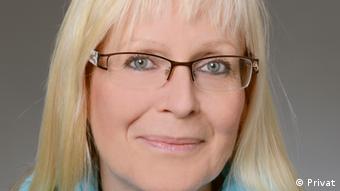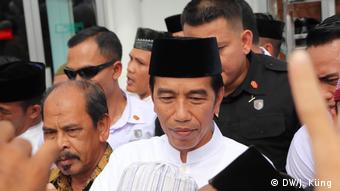In a week will be elected in Indonesia, a new President. The election campaign is dominated by the issue of the increasing Islamization. Whether the democracy is in danger, rate experts in different ways.

Indonesia, the country with the largest Muslim population in the world, selected on 17. April a new President. Since Opening in 1998, democratic country for many years as a model for a state in which the separation of state and Religion works well. Today it is different. “The role of Religion cannot be overestimated. It is the means of making policy. And you will be instrumentalised by all sides,” says Susanne Schröter, Director of the Frankfurt research center Global Islam, in an interview with DW.
So Prabowo, Challenger of the incumbent President Jokowi, and his opponent attacks as not Islamic enough. For example, Jokowi will not be accused of it, pronounce the classical Arabic of the Qur’an correctly. Jokowis election campaign team effort, in turn, the religious Reputation of his candidate, by claiming that he had not attended a Muslim religious school, what corresponds to the facts.

Susanne Schröter: “The Religion is the means to make policy”
In The Case Of Ahok
The special significance of Islam for the Indonesian policy was the case of the former Governor of the Indonesian capital of Jakarta, Basuki Tjahaja Purnama called “Ahok”. Ahok, an ethnic Chinese Christian Indonesian, was up in 2014, Deputy of Jokowi as Governor of Jakarta. After this was elected President, moved to Ahok. In 2016 he became the Governor elections. He was accused of political opponents to be wrong, to have made derogatory comments about the Koran expressed. The rumor spread in the Social media fast. Radical organisations such as the Islamist Hizbut-Tahrir in November and December of 2016, hundreds of thousands of protesters against Ahok on the road.
In may of 2017, Ahok was sentenced for blasphemy. He sat for a total of 21 months in prison. According to the Bonn Indonesian Berthold Damshäuser, the conviction must be scored as a judicial scandal.
The case, Ahok is an example of a “growing intolerance” in the country, the observed Damshäuser for a long time. In particular, young people, Damshäuser, advocated now in the majority, the introduction of Sharia law, and some even up to violence-ranging action against “enemies of Islam”. Around 80 percent of the voters were in 2017, according to a survey from Saiful Mujani Research Consulting between 17 and 34 years old.

Ex-Governor Ahok because of blasphemy on the dock in 2017
This reform era has created space for radical currents
The Islam expert Schröter emphasizes in an interview with DW, growing intolerance and the increasingly strict interpretation of the Muslim faith mainly from two sources: first, from a historical, intra-Indonesian and the other from a younger from abroad.
In the war of independence after the Second world war, Islamist groups played in Indonesia a large role. However, they could not prevail after independence, politically. Indonesia is not a theocracy. Instead, the then President Sukarno declared the state ideology of Pancasila, which is also in the preamble to the Constitution. The Pancasila should promote the national unity of the multi-ethnic state. It includes five principles, which include equal Faith in one of the five major world religions, democracy and social justice.
On Sukarno Suharto, whose authoritarian government’s radical and ultra-left conservative Muslims with little space. In 1998, the democratic reform era of “Reformasi” began. “Democratisation has swept Islamist actors suddenly in the Public and give them space to organize,” says Schröter.

Indonesia’s Founding President Sukarno
The influence of Wahhabism on the education system
More recently, the massive influence of the Gulf States, especially Saudi Arabia was then, but also of Egypt. Conservative Islam Wahabi embossing has taken, especially in the education system. Schröter refers to a variety of scholars that have studied in Saudi Arabia, and then with the ultra-conservative Beliefs, return to Indonesia, where they had as multipliers significant impact on the company.
Damshäuser in the Pesantren (Islamic schools), of which there are many in the country. Here, too, is supported by foreign money, often a more conservative Islam taught. It is therefore no coincidence that especially the youth of the country is getting more and more radical.
The failure of the democratic elites?
Schröter sees a failure of the political elites, which it is not able to fill the democratic Constitution of the country and the liberal orientation of the Pancasila. The first term Jokowis she said: “He has not fulfilled the high expectations that have been put into it.” Neither human rights, nor in fighting a progressive Islamization that he had achieved something.

Parts of civil society are of Jokowi disappointed. In the election campaign of 2014, he promised, for the pluralism. It was felt in the last five years, little to
Damshäuser criticized: “The political Elite in Indonesia, is too often willing to betray their Ideals in favor of a clumsy populism.” It limits at the same time: “But maybe it’s a clever move by Jokowi, to political Islam.” Indonesian politicians should answer the following question: “What is more dangerous: an increasing Islamization or an open split of the country?” Damshäuser can understand that Jokowi concessions not as a President of a multi-ethnic state with a long history of intra-state violence here, not to risk the stability of the country. “Possibly in the hope to integrate the Islamic forces and to tame.” If the successful in the long term, of course, not sure.
Overall Damshäuser is slightly more optimistic than Schröter. “A relapse in the authoritarian conditions of the ‘Reformasi’ or even the establishment of an Islamic state is highly unlikely.”